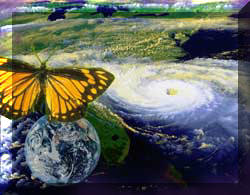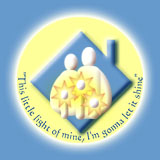| Is it immoral to teach morality? What is
it we are supposed to teach our children? Are we qualified?
Can children teach adults a better sense of morality than adults can
teach children? Is it best to use the past history of
mankind to teach morality or the future? You be the judge. |
 VigilanceVoice VigilanceVoice

www.VigilanceVoice.com
Sunday--December
1, 2002—Ground Zero Plus 445
___________________________________________________________
The Immorality Of Teaching Children
Morality
___________________________________________________________
by
Cliff McKenzie
Editor, New York City Combat Correspondent News
GROUND
ZERO, New York City, Dec. 1 --Is it moral to teach children morality?
In Englewood, Colorado it is--even in public schools to fifth graders.
It is also moral in nations
such as Islamic ones where children are guided by moral fundamentalism. Many
Middle Eastern schools require 60 percent of the curriculum "religious" or "moral" in
nature.
Non secular schools also
teach "morality" by bringing "religion" into the classroom
in Western culture. Many impose or emboss upon children a
"right" and "wrong" or "good" and "bad" spin to teaching.
At Cherry Hills Elementary
School in Englewood, one man is on a crusade to bring morality--as he sees
it-- into the lives of young children, sometimes at the expense of what the
children are being taught by their parents.
 |
|
Fifth graders in
Englewood, Colorado respond in their weekly ethics
discussion taught by Michael Sabbeth. |
Michael
Sabbeth, a lawyer, has instructed some 500 elementary school classes on
morality over the past decade. Sabbeth reminds students that
morality is based on truth not opinion. "If all you have to have is
a good reason you can justify anything," he says. "Hitler thought he
had a good reason. Tim McVeigh thought he had a good reason.
Good reasons are not enough to justify doing immoral things. Write
that down," he instructs.
Sabbeth says he started
teaching on a volunteer basis after major surgery more than a dozen years
ago when he realized he owed a "cosmic debt" for his life. He
started the morality classes when his son was in the fifth grade. They have grown from there.
He uses 11 ethical concepts he refers
to as the "Moral Measures. Four are drawn from
Aristotle's writings: autonomy, beneficence, justice and sanctity of
life. The other seven he constructed: character, choices,
compassion, competence, consequences, conscience and courage.
In one moral discussion he posed the
question whether it was right to steal or not to save someone's life.
A young boy shared that his mother told him that stealing was wrong, no
matter what.
Parents support Sabbeth's teachings,
and often visit the class, reported the Christian Science Monitor in an
article on the "moral teacher" released yesterday.(Nov. 30)
 |
I find
the issue of "moral teaching" in public schools intriguing. I
wonder, however, where the line exists between the "duty of the parent" and
the "responsibility of society" to frame a child's
moral behavior. Society--us average folk--has taken the caboose end of the moral
teaching for years.
By imposing laws for breaking "moral codes" society holds the "punishing
stick" in its hand, swatting out consequences to those who violate the
law after the fact.
Unfortunately, this is a
"Johnny-come-lately" solution to moral shaping. Whatever causes a child to
grow into a "moral violator" cannot easily be changed by prison cells.
Equally of concern is the template that
parents or teachers use to establish "moral guidelines" for children.
In many cases, the moral road is so narrow and restrictive that it becomes
a passion rather than a principle. It funnels those who walk on
strict morality's razor's
edge to jihads. It can also twist a child's mind into such narrow
thinking that he or she becomes "god" and imposes on others penalties for
"moral violations." Such children are trained or shaped to "avenge" the injustices
imposed upon them or the world.
Materialism is often cited as a moral
cancer in both the underprivileged of the Middle East and Western
societ8ies. The poor on both sides learns that everything one has is a measure of what
one "takes" from others. A rich person is a thief.
Emotionally, such a child feels psychologically victimized. He or
she is a nail and everyone else a hammer. Moral righteousness grows
out of disdain for one's station in life. Parents often tell a child that that suffering is "good for the soul"
and that one must carry the burdens of the world to pay for past sins of
others--making them a martyr in diapers.
What I found disturbing in the
article on Mr. Sabbeth was the glaring lack of anti-terror moral purpose
in his principles. In my opinion, morality is simply a tool we
use to avoid Terrorizing ourselves and others. Without a clear and
distinct benchmark to measure moral judgment, the process seems faddic.
Culturally, it appears to be
quite different. In one part of the world a certain behavior is
considered immoral, in another, perfectly moral. Just wars can
exist in one culture and in another, any war is unjust because it takes
life. Morality becomes a ball of wax, easily shaped by
whomever's hands do the molding.
 |
Our older daughter,
for example, is a peace activist, who works with the homeless and
disenfranchised of New York City, and subscribes to a non-violent protest
group I often accuse of being paper-thin communism with God wrapped in the
middle. Politically, we stand at different poles and yet
mutually respect the right to have different viewpoints.
Our grandchildren, I maintain, have the right to become whatever they
chose, and that the morality of the parents--their views on life--should
not be imposed as dictums but rather as suggestions, and the right to
chose one's own beliefs should be instilled at the expense of trying to
mold the child into a clone of household beliefs. I am
adamant about that because we raised our children with that belief
system--that the greatest moral challenge one could ever chose was the
"right to chose." And, with that "right to chose" was
the responsibility to accept whatever consequences came with that choice.
In other words, the goal was to think through a decision to its endpoint,
and to ask oneself, "can I live with the consequences of my actions?"
Choice-Responsibility-Choice-Responsibility-Choice-Responsibility was the
mantra.
I didn't carry morality much
farther than that.
I thought to do so would impinge
upon the beauty of a child's mind, and his or her ability to traverse the myriad
of answers and questions that led one from choice to the destination of
Responsibility. If anything, I would prod my children: "Did you
think about this? Did you consider how this person would feel if you
did that? Did you ask what your motivation was in seeking this
decision--was it selfish or selfless? And could you live with a
selfish decision? A selfless one?"
Our other daughter embarked
on a very different track. She became a federal special law
enforcement agent, standing at the end of the other pole of moral
choices--using the threat of violence to manage societal change versus
non-violent methods. Both, hopefully, seek to improve the
world in their varied ways.
There is one factor I elected to add to the
formula of Choice-Responsibility-Choice-Responsibility. That
was the ultimate end point, the engine behind all moral issues. That
was, "What was right for the children's children's children?"
If a decision made in the immediate could be sighted downstream as having
benefit to the children's children's children, then such a decision was
not just a moral decision, but a Vigilantly Moral one.
Morality, I believe, stops short
of the end goal.
 |
Morality,
I contend, is only a stepping stone toward Vigilance.
Without having a clear and crisp target, a
bull's-eye upon which to aim one's thoughts and resulting actions,
morality becomes as confusing to define as "right" and "wrong," or "good"
and "bad" or "just" and "unjust."
"What is right for the children's
children's children?" forces whomever asks the question to nullify their
personal belief systems regarding race, religion, creed, culture,
ethnicity and stand amidst a field of little children from all walks of
life--balls of innocence--and ponder one's choices in terms of the impact
it will have upon them.
Taking one's decisions far
out into the future is an example of the Butterfly Effect. The
Butterfly Effect simply states that a butterfly's wings flapping in one
part of the world can set off a chain of events that may result in a great
windstorm in another, or a cooling breeze on a hot desert.
 |
|
Butterfly Effect |
 |
In other
simpler words, there is a cause and effect relationship in everything we
do. To guide our moral beacons, the effect of our decisions must be
based on the most powerful impact imaginable--upon the children's
children's children.
Vigilant Morality forces the
moral questions into a rifle barrel. To properly answer any
moral question, one must answer as a guardian of the children's children's
children. One must become a Sentinel of Vigilance looking upon
the horizon of the children's children's children's future to justify with
alacrity why one chooses this act over another.
Vigilance requires
one recognize Fear, Intimidation and Complacency as the enemies of the
children's children's children. To neutralize them,
Vigilance demands one butt up Courage against Fear, Conviction against
Intimidation, and Right Actions against Complacency. But not
to stop there. To complete the "moral formula" one must step outside
one's self, culture, ethnicity, politics, prejudices and scan the horizon
for what is right for all children in the future. While
a decision may fit within the moral guidelines of the present time, when
thrust out to the future, it may have damaging and disastrous effects
three generations or more from now.
Vigilance's goal is to take
the eye patch off the "blind eye." When one looks through only
one eye, there is no depth of vision. One cannot see above the
horizon.
 |
To see
the future, one must carry into it the Beast of Terror. The
Beast of Terror exists in the future as it has in the past and the
present, and no moral decision can be just if it doesn't consider the
dangers of not seeing the Beast waiting in the future, as it has waited in
the past, and stalks us in the present.
This Beast of Terror
is nothing more than our selfishness. It is the myopic
thinking we perform to justify our actions as "right," or "just" or
"worthy," or "honorable." It will cloud our vision
unless checked and give us a righteous platform upon which we can issue
our edicts as though we were gods.
Parents who claim to know what
is right for a child without asking a child what is right for the child,
ignore the beauty of a child's self. Ultimately, they
Terrorize the right of the child to be whomever he or she is.
Parents and societies who impose upon a child a certain cultural set of
behaviors suppress the child's right to chose his or her own destiny, and
hobble humanities evolutionary rights to expand beyond cultural, social,
political restraints that are imposed upon them by "moral teachers" who
exclude the Vigilance Factor--who prefer to use the history of philosophy
rather than its future as moral guidelines.
When I read
that someone is using Aristotle, or has manufactured his or her own
formulations to arrive at moral decisions, I shudder.
I wonder why we as a
society don't reach into the hearts of our children for moral guidance,
and look to the future of their world for moral enlightenment?
I wonder why we are all bent on looking into the rear view mirror of human
evolution as though our past had more value than our future?
I think I know why.
The Beast of Terror wants us to keep the
blind eye on.
If we are afraid and complacent
to look into the future, we will not see how the Beast of Terror can be
hobbled. We will not see the power of the children to be the
architects of morality, and we will continue to assume "parental" control
over teaching morality to children.
 |
The truth is
that a child can teach an adult more about morality than any
adult can teach a child. Children are innocent.
They are pure, yet we deny their fountains of purity as though
our soiled and fouled fountains had greater virtues than those
of the children.
Vigilance gives the children
back the power we rob from them when we try and teach morality.
If we teach anything, let
it be how Vigilance can restrain the Beast of Terror.
Not how the Beast of Terror restrains Vigilance.
Only a child can see the
difference.

Nov. 30--Hemmingway Stalks
Terrorism
©2001
- 2004, VigilanceVoice.com, All rights reserved - a
((HYYPE))
design
|
|












